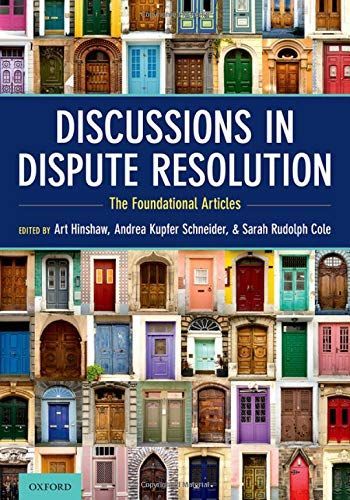
Discussions in Dispute Resolution The Foundational Articles
"As a law professor who teaches civil procedure and mediation, "Pursuing Settlement" reads like a history. Menkel-Meadow's uncanny accuracy in predicting the future, her prescient fears for where institutionalization of ADR might take us, and the remarkable continued relevance of her suggested reforms and accompanying experimentation combine to make an easy case for declaring her work foundational. She challenged us to consider "whether new forms of dispute resolution will transform the courts or whether, in a more likely scenario, the power of our adversarial system will co-opt and transform the innovations designed to redress some, if not all, of our legal ills." (p. 5) And she offered a qualified "no" to the query whether the growth and expansion of ADR within institutions has changed the consciousness of those who solve legal problems. What we now know With the benefit of 27 years of pursuing settlement in the shadow of litigation, what do we now know? Turns out, very little beyond what Menkel-Meadow presaged for us. Without question, I could now teach my entire procedure course using only case law decisions about disputed mediation issues (Coben, 2015). Exactly as Menkel-Meadow predicted, lawyers now routinely "use" mediation as the all-purpose excuse for all sorts of failures and omissions ranging from incomplete discovery and failing to designate trial experts to late-filed motions and untimely requests to amend pleadings (Cole et al., 2019, ch. 5). Lawyers (and clients) fail to realize the numerous ways mediation participation (or non-participation) influences litigation decisions quite distinct from the mediation itself. Courts have, among other things, treated the failure to participate in mediation as a factor in justifying: the pre-judgment attachment of property in aid of security, awards of prejudgment interest, and denials of continuance requests. Mediation behavior also is commonly invoked to support or deny awards of attorney's fees. Moreover, "traps for the unwary" abound (Coben, 2013). Parties have been deemed to have waived objections to venue and personal jurisdiction based on mediation participation. Requesting time to mediate has been deemed evidence of the lack of imminent harm to justify granting of a temporary restraining order. Information exchanged in mediation has been relied upon to establish or negate the amount in controversy necessary to justify federal court diversity jurisdiction and removal. State court mediation efforts have been cited as a reason for federal courts to decline supplemental jurisdiction over state law claims. In my home state of Minnesota, a settlement reached in mediation is evaluated under the law of contracts except that a mediated settlement must include the parties' affirmance that they intend the agreement to be binding upon them for the agreement actually to become binding - an affirmance that most first-year law students learn very early in their studies is akin to the "wax seal" or "ribbon" triviality no longer necessary to create a binding contract"--